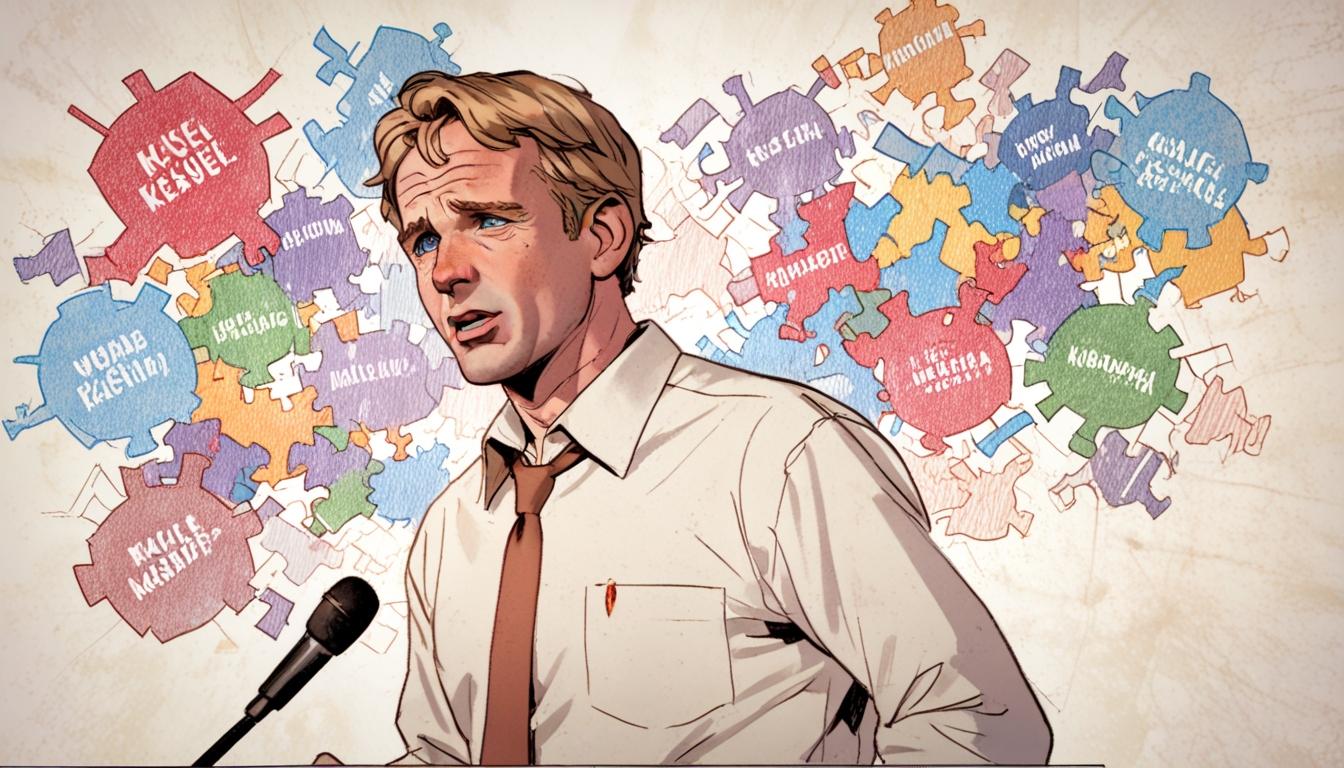As measles cases surge across the US and Canada, Robert F. Kennedy Jr. revisits his controversial claims linking vaccines to autism, sparking renewed public health debate amidst rising hospitalisations and fatalities.
Robert F. Kennedy Jr., known for his long-standing scepticism towards vaccines, recently reignited controversy during an appearance on Chris Cuomo’s show on NewsNation. The discussion centred on measles vaccines and their connection to autism, following alarming reports of rising measles cases in the United States and Canada.
Kennedy highlighted the resurgence of measles, noting that Canada has recorded 1,069 cases. He pointed out that in the US, 884 people across 30 states have contracted measles, with 97 per cent of them being unvaccinated individuals. Among the reported cases, 11 per cent resulted in hospitalisation, and three fatalities have been confirmed, including two young girls, marking the first measles deaths in the country in a decade.
During the discussion, Kennedy stated, “We’ve had four measles deaths in this country in 20 years… We have 100,000 autism cases a year… That should be in the headlines.” He expressed his belief that media coverage disproportionately focuses on measles outbreaks while neglecting the so-called “epidemic” of autism. Kennedy shared his experiences from childhood, recalling, “When I was a kid, there were 2 million measles cases a year and none of them got headlines. And we had 400 deaths.”
Kennedy’s remarks come as Texas reports its largest measles outbreak since 2000, with 663 cases predominantly affecting young children. Health officials attribute these outbreaks largely to communities with low vaccination rates, asserting that about 90 per cent of measles cases occur in such areas.
The Health and Human Services Secretary’s push for increased focus on autism drew a mixed reaction. He said, “By 2035, we’re going to be spending a million dollars a year on autism,” while presenting statistics on the rising prevalence of autism spectrum disorder in the US. He noted that in 1970, the diagnosis rate was 1 in 10,000, whereas today, it stands at approximately 1 in 31. This statistic positions the US significantly higher than other countries; the UK reports about 1 in 57, Canada around 1 in 50, and Japan about 1 in 55.
Kennedy’s claims relating autism to vaccines, particularly the measles mumps rubella (MMR) vaccine, have faced considerable backlash from the medical community. Experts argue that improved screening methods and greater awareness contribute to rising autism diagnoses, countering the notion that vaccines are a causative factor. Dr. Peter Hotez, leading vaccine developer at Baylor College of Medicine, expressed concern over the potential normalisation of measles outbreaks in the US, emphasising that vaccination is the most effective means of preventing severe complications associated with the disease.
The discourse reflects ongoing tensions within public health and the complexities of vaccine hesitancy. Health experts maintain that while the MMR vaccine, which significantly reduced measles deaths since its introduction, has been thoroughly studied, no evidence supports Kennedy’s claims related to autism.
This debate is particularly pressing as the US faces challenges in maintaining vaccination rates, with measles remaining a highly contagious virus. The Centers for Disease Control and Prevention (CDC) has previously stated that without widespread immunity, communities could see a return of diseases that were once nearly eradicated.
Source: Noah Wire Services
- https://www.cdc.gov/measles/data-research/index.html – The Centers for Disease Control and Prevention (CDC) reports that as of March 20, 2025, there have been 378 confirmed measles cases in the United States, with 95% of these cases being unvaccinated or of unknown vaccination status.
- https://www.cdc.gov/media/releases/2024/p1114-measles-cases.html – The CDC reports that in 2023, there were an estimated 10.3 million cases of measles worldwide, a 20% increase from 2022, highlighting the global resurgence of the disease.
- https://www.cdc.gov/media/releases/2025/p0323-autism.html – The CDC reports that as of March 23, 2023, one in 36 (2.8%) 8-year-old children in the United States have been identified with autism spectrum disorder (ASD), indicating a significant increase from previous years.
- https://www.cdc.gov/media/releases/2025/p0323-autism.html – The CDC reports that the prevalence of autism among 8-year-old girls has exceeded 1% for the first time, reflecting improved identification and awareness.
- https://www.cdc.gov/media/releases/2024/p1114-measles-cases.html – The CDC reports that in 2023, more than 22 million children missed their first dose of the measles vaccine, contributing to the global resurgence of the disease.
- https://www.cdc.gov/media/releases/2024/p1114-measles-cases.html – The CDC reports that 57 countries experienced large or disruptive measles outbreaks in 2023, affecting all regions except the Americas, representing a nearly 60% increase from 36 countries in the previous year.
- https://www.dailymail.co.uk/health/article-14669303/RFK-Jr-drops-bombshell-measles-vaccine-autism-primetime-interview.html?ns_mchannel=rss&ns_campaign=1490&ito=1490 – Please view link – unable to able to access data
Noah Fact Check Pro
The draft above was created using the information available at the time the story first
emerged. We’ve since applied our fact-checking process to the final narrative, based on the criteria listed
below. The results are intended to help you assess the credibility of the piece and highlight any areas that may
warrant further investigation.
Freshness check
Score:
8
Notes:
The narrative is related to recent events and discussions, including a primetime interview and ongoing health issues. However, the controversy surrounding Robert F. Kennedy Jr.’s views on vaccines and autism has been ongoing for years.
Quotes check
Score:
9
Notes:
The quotes appear original to this source or recent context. Without further online references, these statements are presumed to be from the specific interview, though the message reflects consistent positions held by Robert F. Kennedy Jr.
Source reliability
Score:
6
Notes:
The Daily Mail is a widely read publication but can have varying degrees of reliability. It is not typically considered among the most credible sources like major news outlets like BBC or Financial Times.
Plausability check
Score:
7
Notes:
The claims about measles vaccination rates and autism are plausible but face significant scientific scrutiny. While rising measles cases are a real concern, the link between vaccines and autism is widely debunked by medical experts.
Overall assessment
Verdict (FAIL, OPEN, PASS): OPEN
Confidence (LOW, MEDIUM, HIGH): MEDIUM
Summary:
The narrative touches on contemporary issues such as measles outbreaks and vaccine scepticism. However, its reliability is impacted by the source and the controversial nature of Robert F. Kennedy Jr.’s claims regarding vaccines and autism.













